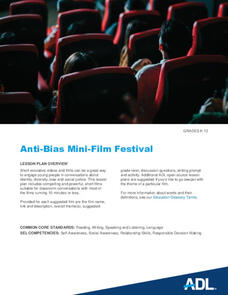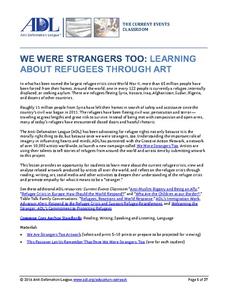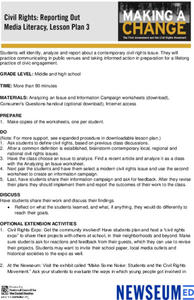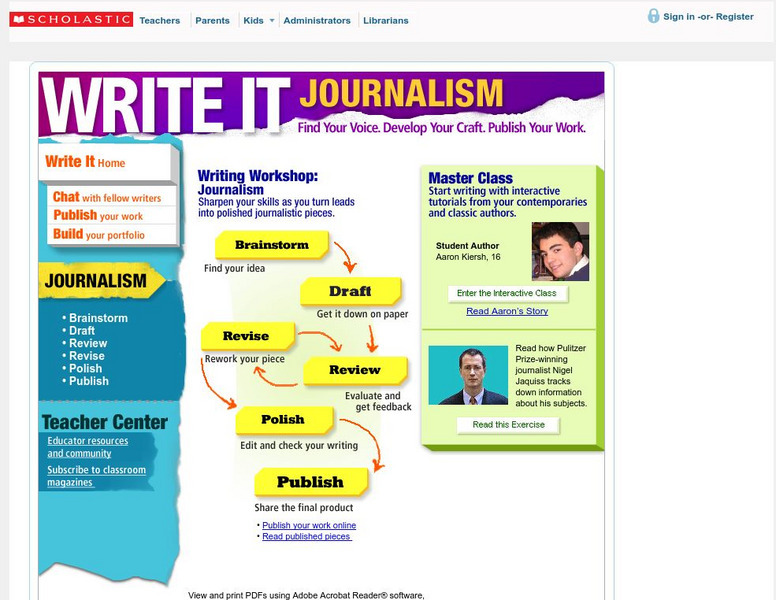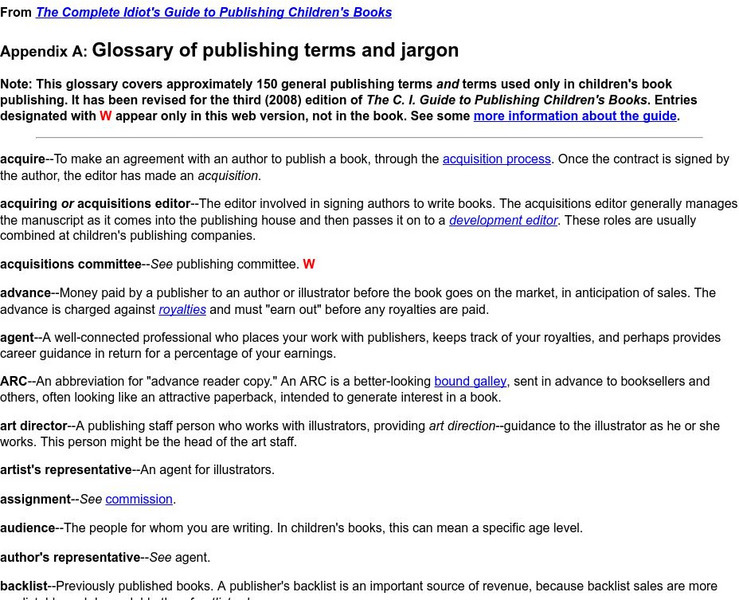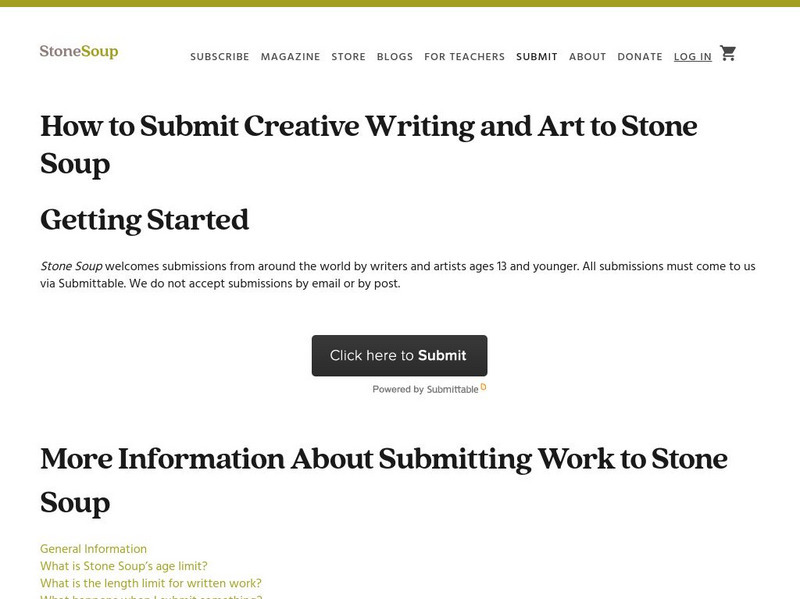Anti-Defamation League
The Revealers: Discussion Guide for Grades 6-8
Suspense! Rebellion! Cyberbullying! No wonder Doug Wilhelm's novel The Revealers appeals to middle schoolers. Instructors new to using the novel and experienced veterans will find this discussion guide invaluable. Discussion...
Anti-Defamation League
Anti-Bias Mini-Film Festival
Imagine a resource that provides all the materials you need to organize a film festival. Imagination becomes a reality with a five-star resource that has done all the work for you. Eight different award-winning short films are featured...
Anti-Defamation League
8 Ideas for Teaching National Hispanic Heritage Month
Here are eight ideas to celebrate National Hispanic Month! Scholars have the opportunity to read and discuss literature, include people and events in history, examine art, watch and discuss films, listen to and dance to music, explore...
Anti-Defamation League
Representing the People: Diversity and Elections
After studying statistics and reading articles about diversity in the 2018 through 2020 U.S. elections, young social scientists discuss what they believe is the impact of having more diverse elected officials. Individuals then select one...
Anti-Defamation League
Women’s Inequity in Pay: Could It Be Sexism, Implicit Bias or Both?
Equal pay for equal work? High schoolers research the reasons for the inequity in women's pay. They read articles, examine graphs, engage in discussion, and then craft an essay in which they suggest a way to address the gender wage gap.
Anti-Defamation League
We Were Strangers Too: Learning About Refugees Through Art
Did you know that "in the largest refugee crisis since World War II, more the 64 million people have been forced from their homes"? The Anti-Defamation League presents an activity that asks class members to examine a series of artworks...
Anti-Defamation League
7 Ideas for Teaching Women's History Month
Celebrate Women's History Month with hands on-learning. The resource provides seven strategies to help educators teach Women's History Month, ranging from watching films to reading books written by women. Activities including writing...
Anti-Defamation League
Addressing Hate Online: Countering Cyberhate with Counterspeech
Cyberbullying is the focus of much discussion. Here's a lesson that offers suggestions for addressing cyberhate. After groups examine different examples of cyberhate, the class adds their suggestions to a list of ideas for how to counter...
Anti-Defamation League
Women's Suffrage, Racism, and Intersectionality
The Nineteenth Amendment granted women the right to vote—as long as they were white. High schoolers read articles and essays about racism in the suffrage movement and consider how intersectionality played a role in the movement. Scholars...
Newseum
Civil Rights: Reporting Out
After brainstorming a list of contemporary local, regional, and national civil rights issues, pairs of scholars select one of these issues and design an information campaign to spread awareness of the issue.
Newseum
Reporting Part III: Staying Objective
The third and final lesson in the Reporting series tests young journalists' ability to be objective in reporting contentious topics. After brainstorming a list of contentious topics that interest them, the class selects one, and...
Newseum
Reporting Part II: Beyond the Basics
Scholars examine the articles written for the series' first lesson and select ones that would benefit from further research. In a 48-hour deadline, teams of three select one topic to investigate in greater depth and craft a revised...
Newseum
Reporting Part I: What Matters to Me
Young reporters have an opportunity to craft a news story about a topic that interests them. Class members brainstorm events and issues that affect them and possible sources of information. Individuals then select a topic, research it,...
Newseum
Political Persuasion: It’s All About Image
Political candidates work hard at creating an image they believe will appeal to voters. High schoolers collect 10 photos and other images of a candidate and analyze them to determine what techniques create a positive or negative impression.
California Department of Education
Learn to Reach Out
High school seniors use the CareerOneStop website to research professional associations related to careers that interest them. They then develop interview questions and arrange an informational interview with someone in the field.
EBSCO Industries
Music and Poetry
Song lyrics, like poems, are meant to be heard. After examining the literary devices in several poems, scholars examine the lyrics of popular songs and identify the sound devices and the figurative language writers use to create the...
Learning for Justice
Change Agents in Our Own Lives
Everyone has the power to change their own lives. Young historians learn how they can become agents for change in their own lives and the community. The lesson focuses on positive role models and what motivates individuals to promote...
Anti-Defamation League
10 Ideas for Teaching Black History Month
Celebrate Black History Month with the help of 10 ideas that delve deep into the history, major events, contributions, famous African Americans, and sheds light on how scholars today can take a proactive stance on current civil rights...
National Endowment for the Humanities
The World of Haiku
Middle schoolers complete a study of Japanese culture through haiku. They read and interpret haiku poetry and write haiku of their own.
Scholastic
Scholastic: Write It: Journalism
This workshop launches will launch students into the writing process. Read advice from Pulitzer Prize winning journalist Nigel Jaquiss, and read work from other students. The Sandwich Critique is an excellent way to peer review. Finally,...
University of Wisconsin
University of Wisconsin: Writing Center: Academic and Professional Writing
The section on Common Types of Writing Assignments is a particularly helpful piece of this site. Learn how to approach a wide variety of writing tasks from lab reports to literary reviews. Then use the rest of the site to learn how to...
Scholastic
Scholastic: News Writing With Scholastic Editors
An excellent site for learning about news writing. This site is an in-depth workshop that takes you through the news writing process step by step by providing examples and tips.
Harold D. Underdown
A Glossary of Publishing Terms and Jargon
An extensive and detailed glossary of the many words and phrases one may come across in the field of publishing. Includes general and basic terms as well as "jargon" only publishers understand.
Other
Stone Soup: How to Submit Creative Writing and Art to Stone Soup
This resource accepts contributions from younger children, up through age 13. This page explains the process to follow when submitting contributions. Also at this site students will find a link to a sample issue.



